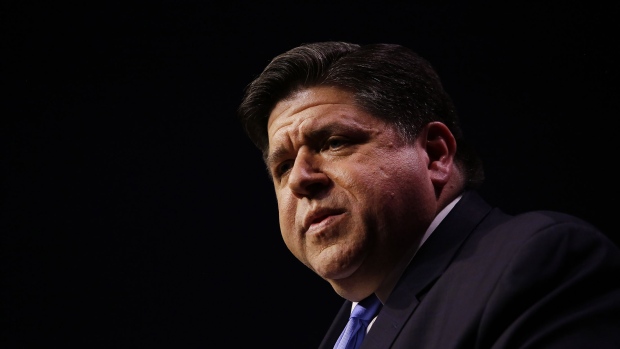Jun 27, 2022
Griffin Pick Faces Trump’s Choice in Illinois GOP Governor Race
, Bloomberg News

(Bloomberg) -- The Republican primary for Illinois governor on Tuesday is shaping up to be a battle of billionaires trying to determine the face of the party in a Democrat-controlled state.
Leading the GOP polls are Darren Bailey, a Bible-quoting state senator backed by former President Donald Trump who has collected $9 million from billionaire Richard Uihlein; and Richard Irvin, the Black mayor of the state’s second-largest city who has received about $50 million from hedge fund billionaire Ken Griffin.
Bailey and Irvin are among six Republicans vying to challenge Governor J.B. Pritzker, the overwhelming favorite to win the Democratic primary, in the November general election. Pritzker, himself a billionaire scion of the Hyatt hotel fortune, will face off against retired Army Major Beverly Miles on Tuesday.
The primary is important for both parties. For Republicans, it may be seen as a referendum on the identity of the GOP in a blue stronghold state. For Democrats, it could signal the level of motivation voters feel to show up at polls as culture wars rage across the US, especially now that the Supreme Court has overturned the constitutional right to an abortion.
“It looks like the primary election will have considerable significance,” said Dick Simpson, a professor of political science at the University of Illinois in Chicago and a former alderman in the city.
The primary showcases a struggle playing out between the moderate wing of the Republican party that wants to put a candidate on the ballot in November who can beat Pritzker, and Trump supporters seeking a nominee who appeals to the former president’s base, Simpson said. Irvin, the mayor of Aurora who was perceived as the frontrunner earlier this year given the millions pumped into his campaign by Griffin, has lagged behind Bailey in several recent polls.
Irvin received another blow this past weekend when Trump endorsed Bailey at a rally in central Illinois.
“Darren is a fearless supporter of the Second Amendment and a tireless champion of religious liberty,” Trump said at a “Save America” rally in Mendon. “He will crack down on the violent crime that is devouring our Democrat-run cities and restore the state of Illinois to greatness. Darren has my complete and total endorsement.”
Trump also called Pritzker “one of the worst governors in America.”
Given that Republicans have little power in Chicago and have ceded the firm grip they once held in the suburbs, they’re trying to establish their future viability in Illinois, which has elected a mix of GOP and Democratic governors over the past several decades, Simpson said.
Voter turnout in primaries and mid-term elections, which has been low in past years, may again be lackluster, but voter engagement is crucial given numerous social and fiscal issues at stake in the state, Simpson said.
For Illinois Democrats, who control both chambers of the state legislature and the governor’s mansion, among the most crucial decisions to watch may be whether voters head to the polls or stay home -- potential indicators of their prospects in the November mid-terms. Crime, inflation and the threat of a recession under their watch have put the state’s Democrats on the defensive as much as their counterparts across the US.
Financial Missteps
Along with social issues, engagement by Illinois voters is crucial given the state’s long history of financial missteps that have led to consequences including a roughly $130 billion unfunded pension liability, Simpson said. An impasse between former Governor Bruce Rauner, a Republican, and the Democrat-controlled legislature led to the state operating without a budget for about two years from 2015 to 2017 and unpaid bills topping $16 billion.
Illinois’s bond rating teetered on the brink of junk amid the pandemic as falling revenue and lack of a rainy day fund forced it to become the only state to borrow from the Federal Reserve’s Municipal Liquidity Facility. Over the past year, the state’s revenue has topped projections amid an economic rebound, billions of dollars in federal stimulus have flowed in and the Pritzker administration has boosted pension contributions and started to rebuild reserves. Illinois also has gotten upgrades from the three major credit rating firms but still remains the lowest rated state.
While Pritzker has presided over a period when Illinois’s fiscal outlook has improved, he’s been criticized for rising crime and most recently the announced headquarters departures of well-known, large companies including Boeing Co., Caterpillar Inc. and Citadel, Griffin’s hedge fund.
Read more: ‘Punch in the gut’ for Chicago: Griffin Citadel move stings city
Griffin particularly has been vocal that concerns about political leadership and crime contributed in his decision to leave the state. In November, he said he was “all in” to support a candidate to unseat Pritzker.
Tuesday’s primary may be the first indicator of how Illinois voters see the situation in the state, said John Shaw, director of the Paul Simon Public Policy Institute at Southern Illinois University.
“Illinoisans, like all Americans, are looking at the current set of circumstances and are fearful and in some ways angry,” Shaw said. “This election is just going to signal or indicate the degree to which Illinoisans blame the current malaise on the Democratic party. What’s unclear is whether voters will punish Democrats in Illinois or whether they will just not vote.”
©2022 Bloomberg L.P.






